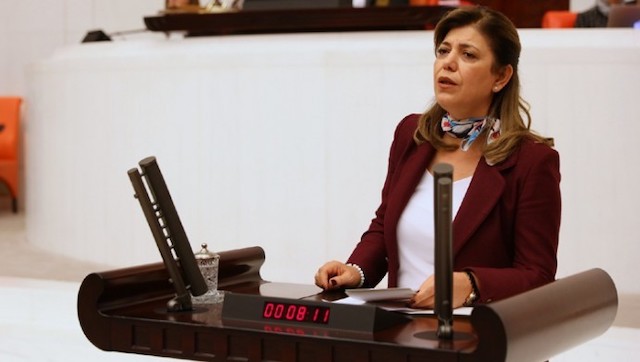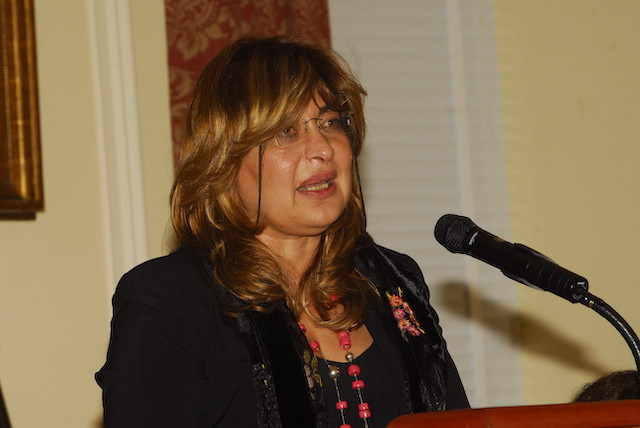Through articles by and interviews with feminists who are experts in their respective fields, 5Harfliler’s “Istanbul Convention Brief” investigates the significance of the Istanbul Convention in the fight against gender-based violence, and what it would mean for women if Turkey were to withdraw. Tuğçe Yılmaz is the editor-in-chief of the series.
Dozens of femicides have taken place in the last month while the debate over the withdrawal from the Istanbul Convention continues. Among these, there are well-known cases such as the killing of Sevtap Şahin by her spouse despite the fact that she had made 60 appeals to the police, all of which were disregarded; and the case of Fatma Altınmakas, who was reportedly unable to make a complaint to the police due to the lack of a Kurdish-speaking official and was ultimately murdered by her spouse.
Nahide Akgün is one of the several women who made many complaints against her spouse about violence against herself and her family members, and who was unprotected. The violence caused the brutal killing of Nahide’s mother, Minteha Beybur, in front of her. After she got married in November 1995, residing in the southeastern province of Diyarbakır, Akgün and her mother were subjected to different forms of violence by Hüseyin Opuz for three years. On one occasion, Opuz stabbed Akgün with a knife, at another point, he ran down Akgün and her mother with a car. Appearing at the local court, Hüseyin Opuz was released for lack of evidence. The court later sentenced the perpetrator to three months’ imprisonment for running over Akgün and her mother with a car, but the sentence was commuted to a fine.
On March 11, 2002, as Akgün’s mother Minteha Beybur was in a moving company’s pick-up truck while the family was preparing to move to İzmir, Hüseyin Opuz pulled up in front of the truck and shot her. On March 13, 2002, a public prosecution was initiated against Opuz, accusing him of intentional murder. Nahide Akgün was able to divorce Hüseyin Opuz after he killed her mother. Following the divorce, Akgün brought the case to the European Court of Human Rights (ECHR). The ECHR found Turkey in violation of its obligations to protect women from domestic violence, and for the first time recognized, in a landmark decision, that the failure of a state to address gender-based domestic violence is tantamount to a form of discrimination.
We spoke with Meral Danış Beştaş, member of the Parliament (MP) for the southeastern Siirt province from the Peoples’ Democratic Party (HDP), one of the lawyers spearheading the case. Beştaş talked about the case, the experiences of Nahide Akgün, and the domestic and legal pressures they experienced at that time.
How did you get involved in the case of Nahide Opuz (Akgün)?
I was involved in the case when the local proceeding was going on. At that time, I was the president of the Diyarbakır Bar Association Women’s Rights Counseling and Implementation Center. Many women experiencing violence were already applying to the center [for services? support?]. One day, a woman called Minteha Beybur came to us. She said that her daughter was in intensive care, and had been suffering from severe domestic violence. The mother further added that the perpetrator was still threatening her daughter, and had not been arrested. Together with my spouse, Mesut Beştaş, who is also a lawyer, we got involved in the case to represent Nahide at the court. Prior to this, there were already several complaints [by the victim and her family], which had ended with nonsuits and the release of the perpetrator. We filed for divorce and exhausted all available domestic remedies within Turkish law. As a feminist activist, I am familiar with similar cases, and we were not surprised to see the tolerance and impunity that the perpetrator enjoyed when domestic law was practiced. After a short while, Minteha Beybur was killed by the perpetrator, and upon Nahide’s request, we brought the case to the ECHR.
What was Nahide thinking about the ECHR process?
It is difficult to say that Nahide was very optimistic about the process. After all, she was subjected to domestic violence several times, threatened, admitted to intensive care, run over by a car, and in a separate assault, stabbed. I am talking about a woman who experienced all forms of violence. Meanwhile, her spouse was forcing Nahide to withdraw her complaints, she was under social pressure, and her children were in need of care. However, the situation was unbearable for her, her mother’s death was a huge trauma. We talked to her about the process, saying that we are applying to the ECHR. She was not hopeless, instead very determined to go to any lengths.
As the lawyers of the case, what were your experiences, especially considering the landmark ruling?
After the killing of Minteha Beybur, Hüseyin Opuz was arrested and later released. At that time, we received threats but did not give heed to them. As her lawyers, we were not under tangible pressure while leading the case, however, the attitude of the patriarchal society towards the situation was clear. The whole process was a struggle against this patriarchal attitude. Both then and now, I’ve been a rights advocate and as I said, I am familiar with such cases. My spouse, Mesut Beştaş, has extensive work on women’s rights, which is something that I am mentioning for the first time. This is why we did not restrict ourselves to what we know about the case during the ECHR process, but referred to certain studies as sources, which the Women’s Rights Center had previously done. We prepared for the case by referring to the relevant data from Amnesty International, the rulings of similar cases in Turkey and their judicial processes, and as well considered the sociological background and the attitudes of the state to similar cases. We also received the support of women’s organizations in Europe. The case took around 10 years and we never gave up. The ruling marked the first time there was a decision of discrimination over domestic violence. The phrase “discrimination” is very important here because the decision recognized that a woman was subjected to discrimination for being a “woman.”
How did Nahide react to the decision?
She was very delighted at the decree, but only for a short while. Nahide was feeling very uneasy as her name was made public. She moved to an unknown address with her children and was given close police protection, which was later revoked. She was worried about her sister, and never talked to anyone in the press, giving us the consent to speak for her. After all, she was experiencing trauma, especially with the killing of her mother. It is not fair to make her remember this. She also did not accept professional support or therapy. The case made headlines in Turkey with broad repercussions. There were statements at ministerial and prime ministerial level, some saying “You are denouncing Turkey.” Despite these, Nahide finally found some peace with this decree.
As a woman and also a feminist lawyer, is there something that particularly touched you in this case?
I was really affected by seeing a mother whose daughter was in intensive care, as she was also deeply concerned for her grandchildren. Nahide’s mother was quite courageous and she only wanted to protect her daughter. This is how she came to us as she was also suffering from violence. She said, “I do not accept this, even if Nahide does so.” Frankly speaking, the killing of Minteha Beybur which I learned of in a newspaper, and when I later saw her lifeless body, these are what affected me the most. I still clearly remember the news in the local newspaper Söz. The fact that she initiated the case and made an appeal was very important. I think this is also very important for all women, and her name should be remembered with Nahide. Women’s rights advocates emotionally get hurt in each case they are involved, yet this one affected me particularly for this reason. Nahide’s refusal to stop resisting and making complaints 36 times, despite moments of uncertainty, was very impressive.
Could you compare that period with the one we are currently in with the Istanbul Convention?
I cannot say that any period is easy for women. However, during that period, violence against women was instrumentalized by the ruling AK Party for the sake of their own policies. The decree of the Opuz Case formed the backbone of the Istanbul Convention. Of course, we cannot disregard the significance of the immense resistance by women up to that point. The decree recognizing gender-based discrimination laid the foundation of the Convention, and this is why we call it as the Convention’s backbone. The ruling government was initially trying to benefit through women friendly policies. Today, we can see how insincere they are. Things also were not easy that time, however, violence against women has gradually become more visible and the situation has worsened during the AK Party rule,. Tolerance of and impunity by perpetrators has increased, forms of violence have changed, and their scope has broadened. The spaces for women have gradually narrowed.
Sexist statements are now more easily voiced compared to the time of our case. If boldness would be the right term to use, the government has become “bolder” in its violations. The withdrawal from the Istanbul Convention remains on the agenda while femicides still continue with the recent ones of Fatma Altınmakas and Pınar Gültekin. This manifests that the ruling government discards everything, especially women’s rights policies, as it gets more power.
What do you think would be the consequences of withdrawing from the Convention?
First of all, it is necessary to underline that we, as women, will never tolerate and let this happen. Withdrawing from the Convention would mean the highest approval of murder, discrimination, torture of women, and violence against them, while acknowledging that women are not entitled to the right to live at all. I am saying this theoretically. Because notwithstanding the Convention, the Constitution principally regulates the related responsibilities of the state. The Convention precisely elaborates on preventing violence against women by clarifying all forms of violence and encouraging education on gender equality. This is why withdrawing from the Convention would mean that “I will not exercise its provisions.” I see this attempt to test the waters of public opinion. I should further add that I am proud to be a part of the women’s movement on this land. The dynamism is substantial. Indeed, this is the success of the women’s movement in Turkey as it has become the most dynamic group in public spaces, everyone is now talking about the Istanbul Convention. I do not even want to even think of the possibility of a withdrawal. As I said, we will never let it happen.
Finally, would you like to say something to women?
I would like to address the women who vote for the ruling government and are involved in politics with them. We are talking about a political party that does not recognize women. They do not accept women as an individual and a human being. The women in the party should raise their voice out and present their stance, starting within the party itself. I am making this call not as an MP of the HDP but as a woman. If Erdogan is saying “Put one or two female MPs on the stage, symbolically,” then there is no place for women in that party. It is necessary to approach this situation beyond political lines.
As HDP, we immediately reacted with a principled approach when a woman inside the party recently stated that HDP MP Tüma Çelik raped her. But the fact that despite all our egalitarian policies in the HDP, these kinds of incidents happen in our political party too. This means that patriarchy is very powerful, and we, as women, should stand against it altogether. We never feel frustration in our fight, neither inside nor outside. Being a woman should be our common ground in this struggle. There is a lot of work we can do, and we, after all, are half of this country. If we go hand in hand for a free, equal, and fair life for all, I think nothing can stand against us.
Translated from the original Turkish by Gülşah Kahyaoğlu.




